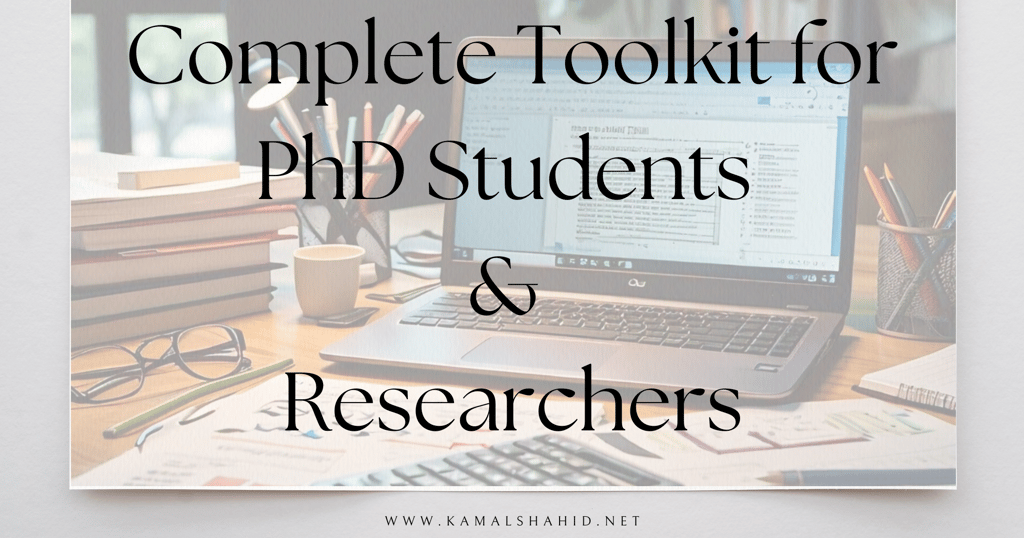A Complete Toolkit for PhD Students and Researchers
Essential tools every PhD student and researcher needs for a smoother, more efficient research journey.
Kamal Shahid
10/8/20243 min read


Embarking on the research journey is both thrilling and overwhelming. From reviewing existing literature to designing experiments, analyzing data, and finally publishing your work, the process demands a diverse set of tools to keep everything in check. Here’s a breakdown of the go-to tools that every PhD student and researcher should have in their toolkit for a smoother, more efficient research experience:
1. Literature Review: Navigating the Knowledge Landscape
The first step of any research project is diving deep into existing knowledge. Comprehensive databases like IEEEXplore, ScienceDirect, Elsevier, Frontiers, MDPI, Google Scholar, PubMed, and JSTOR are invaluable for accessing a wealth of academic literature. Once you’ve gathered your sources, keeping track of them can become overwhelming.
Citation management tools like Zotero and Mendeley will help you organize references but also allow you to annotate them for future use, making your review process much easier to manage.
2. Data Collection and Analysis: Turning Information into Insights
Data is the backbone of any research, and analyzing it correctly is crucial. For quantitative researchers, statistical software like Mathwork's MATLAB, SPSS, R, and Python’s Pandas library are indispensable for performing everything from basic statistical tests to complex data modeling.
For those focusing on qualitative data, tools like NVivo and ATLAS.ti make it easier to code and conduct thematic analysis, helping you uncover meaningful patterns within your data.
3. Experimental Design: Bringing Structure to Your Research
Designing a sound experiment or survey can make or break your research. Platforms like Qualtrics and SurveyMonkey are perfect for creating surveys that are easy to distribute and analyze. For researchers in fields like psychology or neuroscience, specialized software like E-Prime and PsychoPy offers robust tools for designing and running experiments, ensuring precision and reliability in your experimental data.
4. Programming and Simulation: Modeling Your Way to Success
Many research projects require coding for simulations or data modeling. Python, MATLAB, and R are popular programming languages that allow you to develop algorithms, run simulations, and analyze complex data. Pair these with powerful IDEs (Integrated Development Environments) like PyCharm and RStudio for a streamlined coding workflow that makes even the most complex tasks more manageable.
5. Visualization and Presentation: Telling Your Story with Impact
Once you’ve collected and analyzed your data, presenting your findings clearly and effectively is key. Visualization tools like MATLAB, Tableau, Matplotlib, and ggplot2 can help you create visually appealing and informative charts, graphs, and interactive dashboards. And when it comes to sharing your results, Microsoft PowerPoint and LaTeX Beamer are essential for creating polished presentations that leave a lasting impact on your audience.
6. Collaboration and Communication: Staying Connected with Your Team
Research rarely happens in isolation. Collaboration tools like Trello, Asana, and Basecamp can help manage tasks, deadlines, and milestones, keeping everyone on the same page. For real-time communication and file sharing, platforms like Slack and Microsoft Teams allow seamless interaction with your peers, advisors, and collaborators, making sure you’re always in sync.
7. Writing and Publication: Crafting and Polishing Your Manuscripts
The writing process can be daunting, especially when it comes to adhering to journal formatting guidelines. Word processors like Microsoft Word and LaTeX offer the flexibility and precision needed to draft and format your manuscript. For fine-tuning your writing, tools like Grammarly and Hemingway Editor can help ensure clarity, coherence, and a professional tone throughout your work.
Final Thoughts
The journey from research idea to published paper can be long and winding, but with the right tools at your disposal, each stage of the process becomes more manageable. Whether you’re just starting out or nearing the finish line, investing time in mastering these tools will not only enhance the quality of your work but also streamline your research experience, helping you reach your goals more efficiently.

